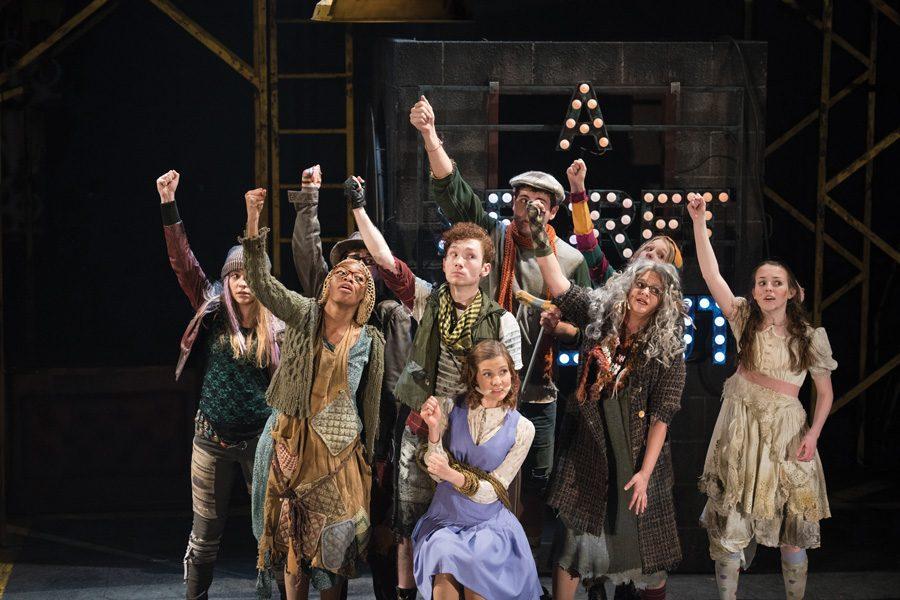Urinetown cast satirizes musical theater, politics
Katie Pach/Daily Senior Staffer
In “Urinetown: The Musical,” a group of townspeople rebels against a company who is charging them to use toilets. The production will run Friday through Feb. 26 in the Ethel M. Barber Theater.
February 8, 2017
In a dystopian world marked by the dilapidated “L” train stop that looms onstage, 16 actors balance humor and political satire as they fight over the right to pee for free.
“Urinetown: The Musical,” which opens Friday and runs through Feb. 26 in the Ethel M. Barber Theater, tells an over-the-top story about corporate greed and revolution, paying tribute to and poking fun at traditional musical theater. The show follows a ruined city, where private toilets are illegal and a single company charges people for the right to go to the bathroom — until a newcomer decides to rebel.
Director Scott Weinstein (School of Communication ’10) said the show viciously makes fun of itself and its Brechtian style — a style that involves its narrator breaking the fourth wall with tongue-in-cheek explanations of the events transpiring on stage.
“A lot of the humor in the show is that it takes this ridiculous premise very seriously,” Weinstein said. “We’re telling this show’s jokes with a straight face to the extreme.”
To keep the show fresh without changing its original script too much, the cast is working down to the second with Weinstein to make sure the humor lands well, Communication senior Eddie Sánchez said.
“We have a hard time not breaking character on stage because, even this late in the rehearsal process, we are always finding new ways to say things,” said Communication junior Rachel Guth, who plays Hope Cladwell, an endearingly innocent woman who joins the revolution.
In playing narrator and sometimes-villain Officer Lockstock, Sánchez said his work with Weinstein and the rest of the rehearsal team was a process of learning how to walk the line between over-the-top and understated humor.
“It’s a thing of believing that the audience is smart enough to pick up on the humor when you deliver it in the subtle way, as opposed to beating them over the head with it,” he said.
Physical humor is also an emphasis in the show. Because “Urinetown” typically requires a larger cast, every actor in Northwestern’s production must be constantly moving to maintain the show’s energy. The seven ensemble members rarely leave the stage, apart from quick changes, Guth said.
“At one point, the ensemble members have three high-spirited dance numbers in a row,” she added. “They only leave the stage for a number or two, and, without them, large parts of the first act would just be me tied to a chair.”
Since the show’s setting has been updated from the 1930s to the mid-2000s in this production, and the villain is a businessman in charge of the water supply and government, the parallels to modern politics are evident, Guth and Weinstein said.
However, Sánchez said the show also illustrates that rebellion is complicated in reality and requires a lot of thought.
“As ridiculous as this show is,” he added, “The musical’s very clear in the way that it talks about how love isn’t going to fix our problems single-handedly.”
Email: rachelholtzman2018@u.northwestern.edu
Twitter: @rdanielle1995



